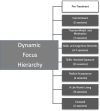A research programme to evaluate DBT-PTSD, a modular treatment approach for Complex PTSD after childhood abuse
- PMID: 30873283
- PMCID: PMC6402166
- DOI: 10.1186/s40479-019-0099-y
A research programme to evaluate DBT-PTSD, a modular treatment approach for Complex PTSD after childhood abuse
Abstract
Background: Posttraumatic stress disorder (PTSD) after childhood abuse (CA) is often related to severe co-occurring psychopathology, such as symptoms of borderline personality disorder (BPD). The ICD-11 has included Complex PTSD as a new diagnosis, which is defined by PTSD symptoms plus disturbances in emotion regulation, self-concept, and interpersonal relationships. Unfortunately, the empirical database on psychosocial treatments for survivors of CA is quite limited. Furthermore, the few existing studies often have either excluded subjects with self-harm behaviour and suicidal ideation - which is common behaviour in subjects suffering from Complex PTSD. Thus, researchers are still trying to identify efficacious treatment programmes for this group of patients.We have designed DBT-PTSD to meet the specific needs of patients with Complex PTSD. The treatment programme is based on the rules and principles of dialectical behavioural therapy (DBT), and adds interventions derived from cognitive behavioural therapy, acceptance and commitment therapy and compassion-focused therapy. DBT-PTSD can be provided as a comprehensive residential programme or as an outpatient programme. The effects of the residential programme were evaluated in a randomised controlled trial. Data revealed significant reduction of posttraumatic symptoms, with large between-group effect sizes when compared to a treatment-as-usual wait list condition (Cohen's d = 1.5).The first aim of this project on hand is to evaluate the efficacy of the outpatient DBT-PTSD programme. The second aim is to identify the major therapeutic variables mediating treatment efficacy. The third aim is to study neural mechanisms and treatment sensitivity of two frequent sequelae of PTSD after CA: intrusions and dissociation.
Methods: To address these questions, we include female patients who experienced CA and who fulfil DSM-5 criteria for PTSD plus borderline features, including criteria for severe emotion dysregulation. The study is funded by the German Federal Ministry of Education and Research, and started in 2014. Participants are randomised to outpatient psychotherapy with either DBT-PTSD or Cognitive Processing Therapy. Formal power analysis revealed a minimum of 180 patients to be recruited. The primary outcome is the change on the Clinician-Administered PTSD Scale for DSM-5.
Discussion: The expected results will be a major step forward in establishing empirically supported psychological treatments for survivors of CA suffering from Complex PTSD.
Trial registration: German Clinical Trials Register: registration number DRKS00005578, date of registration 19 December 2013.
Keywords: Childhood abuse; Complex posttraumatic stress disorder; Dialectical behavioural therapy; Randomised controlled trial.
Conflict of interest statement
This study approval was obtained from the independent Ethics Committee of the Medical Faculty Mannheim at Heidelberg University (Reference number: 2013–635 N-MA). The study was also approved by the ethics committee of Goethe-University and Humboldt University.Not applicable.On behalf of all the authors, the corresponding author states that he has no competing interests.Springer Nature remains neutral with regard to jurisdictional claims in published maps and institutional affiliations.
Figures
References
-
- Stoltenborgh M, Van Ijzendoorn MH, Euser EM, Bakermans-Kranenburg MJ. A global perspective on child sexual abuse: meta-analysis of prevalence around the world. Child Maltreat. 2011;16:79–101. - PubMed
-
- Stoltenborgh M, Bakermans-Kranenburg MJ, van Ijzendoorn MH, Alink LR. Cultural–geographical differences in the occurrence of child physical abuse? A meta-analysis of global prevalence. Int J Psychol. 2013;48:81–94. - PubMed
-
- Brown J, Cohen P, Johnson JG, Smailes EM. Childhood abuse and neglect: specificity of effects on adolescent and young adult depression and suicidality. J Am Acad Child Adolesc Psychiatry. 1999;38:1490–1496. - PubMed
-
- Cutajar MC, Mullen PE, Ogloff JR, Thomas SD, Wells DL, Spataro J. Psychopathology in a large cohort of sexually abused children followed up to 43 years. Child Abuse Negl. 2010;34:813–822. - PubMed
LinkOut - more resources
Full Text Sources


